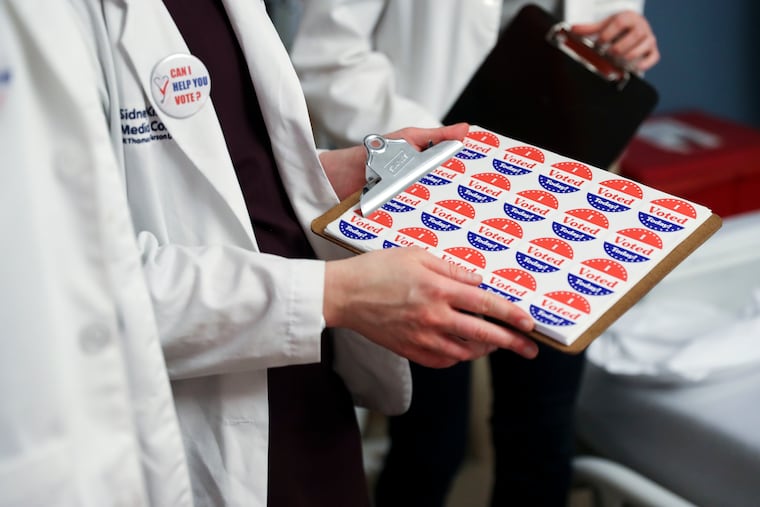Philly hospital patients were missing elections, so students are helping them cast absentee ballots
Pa.’s absentee ballot laws are so restrictive that just a small percentage of voters cast them, and an unplanned hospitalization can leave voters disenfranchised. Jefferson students hope to counter that.

Ruth Edwards doesn’t miss an election. Never has, since age 18.
“Try and stop me,” the 65-year-old Oxford Circle resident said.
But an unexpected hospital stay appeared to derail that plan. On Tuesday, Edwards thought, she’d have to skip voting.
Then she saw the little sign on her lunch tray: Thomas Jefferson University Hospital patients can text a number and receive help submitting an emergency absentee ballot, a little-used and somewhat onerous process.
“I did a little dance in my seat when I read the thing,” Edwards said.
Soon, JeffVotes volunteers were helping her fill out one of those emergency ballots.
The program, started last year by Kimmel Medical College students at Thomas Jefferson University, is one of several in the city in which students help patients exercise their right to vote from their beds.
Pennsylvania’s absentee ballot laws have long been so restrictive that just a small percentage of voters cast them, and an unplanned hospitalization can leave voters disenfranchised. The students are fighting that.
“Just because you are in the hospital setting does not mean that you should be taken out of the day-to-day events of the world,” said Kathryn Linder, 29, a third-year medical student who started JeffVotes. “It gives them a sense that they are very much still part of the community while they’re hospitalized.”
How emergency absentee ballots work
In Pennsylvania, the deadline for requesting an absentee ballot is a week before an election and those ballots have to be returned by the Friday before an election to be counted. (Those tight deadlines are changing, after Gov. Tom Wolf on Thursday signed into law a broad set of changes to the state’s electoral system.)
Anyone who has a sudden need to vote absentee can request an emergency ballot. That requires filling out an application that is notarized, signed by a doctor, and delivered to elections officials.
The process becomes even more complicated in the days leading up to an election, when a Common Pleas Court judge weighs emergency requests for absentee ballots. In the 2016 primary, just 57 emergency absentee ballots were cast; that number spiked to 203 in last November’s election.
How students are helping
In addition to JeffVotes, similar programs have sprung at Temple University and the University of Pennsylvania.
Generally, students get the word out by going room to room in a hospital, putting up fliers and asking nurses to spread the word. The Penn Votes and Presby Votes programs at Penn Medicine hospitals used small signs on food trays sent to patients, which the Jefferson students learned about and adopted. At Temple, the in-room TV displays an ad for their program.
Students hand-deliver applications to City Hall and return with absentee ballots. They then make the trip again to submit them.
“We’re taking some of the obstacles out of the process, taking care of as much as we can, so they can focus on getting well,” said Neil Deininger, 26, a third-year law student who coordinates volunteers for Penn Votes and Presby Votes.
Deininger cites a personal connection: He was born on Election Day in 1992 and his mom didn’t get to vote.
Judd Flesch, a doctor who helps run Penn Votes and Presby Votes, described the program as fitting squarely within the hospitals’ mission.
“We’re in the business of caring for people,” he said. “The best health-care providers … aren’t treating a disease, we’re treating a patient.”
How students benefit, too
For the first- and second-year medical students, canvassing patient rooms can help them become more comfortable roaming a hospital and interacting with patients.
“You’re mostly studying and not getting that much patient exposure,” said Alisha Maity, 26, a fourth-year medical student who helps run JeffVotes.
At Penn, the focus this election is on last-minute requests that need court approval; law students present those to a judge. They’ve also run into opposition in the courtroom in the past, adding to the learning experience.
How hospital voting helps the community
Assisting patients in voting also deepens relationships between the public and the hospitals and schools, said Dwight McBee, chief experience officer at Temple University Health System, where undergraduate students participate in the absentee ballot program.
“We want to make sure that voting rights is something that we make a process for our patients for,” he said. “It’s aligned with our mission to really take great care of our community.”
Maity and Linder connected patients voting to broader issues of civic engagement and representation, noting that people of color, people with disabilities, and people who are poor are less likely to vote while being more likely to need medical attention and policy changes that can help them.
“They are the ones getting disenfranchised, and then they’re not able to vote for people who might be able to vote for the system that might actually help,” Maity said. Voting and civic engagement, she said, “should be a part of public health. It’s a public health issue.”